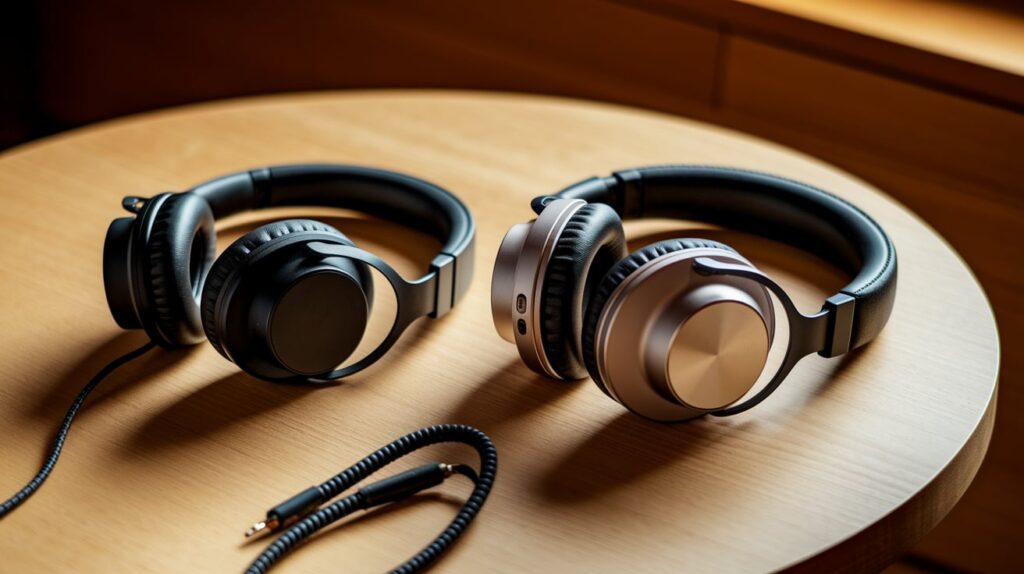Imagine the freedom of movement without tangled cords, the sleek design, and the convenience of wireless headphones. But as you bask in this audio bliss, a question might pop into your mind: Are wireless headphones safer than wired ones?
You might be concerned about radiation, sound quality, or even the potential risks to your health. This is a question many of us ponder, especially as technology continues to evolve and become an integral part of our lives. It’s important to consider all aspects before making a choice that affects your daily routine.
You will uncover the truths and myths surrounding wireless and wired headphones. You’ll learn about the scientific research, expert opinions, and real-world experiences that could influence your decision. Stay tuned, as this knowledge might just change the way you listen to your favorite tunes or podcasts.
Wireless Vs Wired: Health Concerns
Choosing between wireless and wired headphones involves more than just sound quality. Health concerns are important too. Each type has distinct health-related aspects to consider. Wireless headphones offer freedom of movement. Wired headphones avoid potential radiation exposure. Let’s explore these health concerns.
Radiation Exposure
Wireless headphones use Bluetooth technology. This emits low levels of non-ionizing radiation. Some people worry about long-term exposure. Experts say these levels are generally safe. Wired headphones do not emit radiation. They connect directly to devices. This eliminates any radiation concerns.
Physical Safety
Wired headphones can pose a risk. Cables may tangle or snag. This can lead to accidents, especially during exercise. Wireless headphones remove this risk. No cords mean fewer tangles. They allow more freedom to move safely.
Both types have their pros and cons. Consider personal health preferences. Think about daily activities and lifestyle. Choose headphones that fit your needs best.
Sound Quality Comparison
Wireless headphones reduce the risk of tangled cords, offering a safer experience during movement. They emit less radiation compared to phones. Wired headphones provide consistent sound quality but can be less safe during physical activities. Balancing sound quality and safety is key when choosing between them.
When choosing between wireless and wired headphones, sound quality is often a top priority. You might wonder if one type delivers better audio performance than the other. Let’s dive into the details and see how these options stack up.
Audio Performance
Wired headphones generally offer superior audio clarity. They connect directly to the device, ensuring a clean and stable signal. This direct connection often results in a richer and more detailed sound experience.
However, wireless headphones have come a long way. Thanks to advancements in Bluetooth technology, many modern wireless models deliver impressive sound quality. High-end wireless headphones can now compete closely with their wired counterparts.
Consider your listening habits. If you’re an audiophile who craves perfect sound, wired might be your best bet. But if you value convenience, wireless can still offer excellent performance.
Interference Issues
Interference is a common concern with wireless headphones. Bluetooth signals can be disrupted by other electronic devices, leading to occasional dropouts or reduced sound quality. You might have experienced this if you’ve tried to use wireless headphones in a crowded cafe.
Wired headphones, on the other hand, are immune to such interference. They maintain a consistent connection, unaffected by other devices in your vicinity. This reliability is a strong point in favor of wired options.
That said, many wireless headphones now use advanced technology to minimize interference. Some even offer noise-cancelling features that further enhance the listening experience.
Think about your environment. Do you often find yourself in places with lots of electronic gadgets? If so, wired headphones might provide a more consistent experience. But if you’re usually in less crowded settings, modern wireless headphones can serve you well.
Ultimately, the choice between wireless and wired headphones boils down to your specific needs and preferences. What do you value more—audio purity or the freedom of movement? Your answer will guide you to the right decision.
Durability And Lifespan
Wireless headphones often offer greater durability and lifespan compared to wired ones. Fewer physical connections mean less wear and tear. Enhanced battery technology contributes to longer usage time without frequent replacements.
Wireless headphones often boast advanced technology and sleek designs. Yet, durability and lifespan remain crucial factors. Users want their investment to last long. Let’s dive into these aspects for both types.
Wear And Tear
Wired headphones have fewer electronic parts. This makes them less prone to damage. Their cords can tangle, though. Tangles lead to frayed wires. Frayed wires affect sound quality. Wireless headphones lack cords. Yet, they have delicate components. These include buttons and hinges. Regular use can wear these out.
Battery Life
Wireless headphones rely on batteries. Battery life varies by brand. Some last hours; others days. Frequent charging can degrade batteries. Degraded batteries shorten lifespan. Wired headphones don’t need batteries. They work as long as they connect. This gives them an edge in longevity.
“`
Convenience And Accessibility
Wireless headphones offer more convenience and accessibility than wired ones. They eliminate tangled cords, allowing freedom of movement. Their easy connection to devices makes them a popular choice for many users.
Wireless headphones have gained popularity for their convenience and accessibility, making them a preferred choice for many. Unlike their wired counterparts, wireless models offer a seamless experience that caters to the fast-paced lifestyle of today’s world. But are they truly safer? Let’s delve into the convenience they provide to understand their impact better.
Mobility Benefits
The freedom to move around without being tethered to a device is a significant advantage of wireless headphones. Imagine working out at the gym or doing household chores without worrying about tangled cords. This mobility allows you to multitask effortlessly, enhancing your productivity and enjoyment.
Additionally, wireless headphones are perfect for travel. You can easily stow away your device in a bag or pocket and continue enjoying your music or podcasts without interruption. This is particularly useful during commutes where space is limited and efficiency is key.
User Experience
Wireless headphones offer an intuitive user experience that appeals to tech-savvy and non-tech-savvy individuals alike. Pairing them with devices is usually a straightforward process, often requiring just a few taps on your screen. This ease of use means less time fiddling with settings and more time enjoying your audio.
Some models even come with features like touch controls and voice assistants, making it easier to manage calls, adjust volume, or change tracks without reaching for your phone. This hands-free capability can be a game-changer, especially in situations where your hands are otherwise occupied.
Despite these benefits, it’s crucial to consider your personal needs and preferences. Does the convenience of wireless technology outweigh any potential safety concerns you may have? Your choice should align with what best fits your lifestyle and ensures your peace of mind.
Cost Implications
Wireless headphones might seem safer, but they come with their own costs. They often require regular charging and can be more expensive upfront compared to wired ones, which are usually cheaper and don’t need batteries.
When choosing between wireless and wired headphones, the cost implications can be significant. Understanding these differences can help in making an informed decision. Wireless headphones often come with a variety of features that affect both the initial investment and ongoing maintenance costs. Let’s delve into these aspects to provide clarity and guidance.
Initial Investment
Wireless headphones generally have a higher initial price. This is due to advanced technology. They offer features like Bluetooth connectivity and noise cancellation. These features enhance the listening experience. Wired headphones are usually cheaper. They rely on basic technology and less complex components. The choice might depend on budget and feature preference.
Maintenance Costs
Wireless headphones might require more maintenance. Charging the battery is a regular task. Batteries can lose efficiency over time. This leads to replacement costs. Wired headphones need less maintenance. They don’t require charging or battery replacements. Simple care can extend their lifespan. Consider the cost of batteries and potential repairs. This is vital for long-term budget planning.
Environmental Impact
Exploring the safety of wireless versus wired headphones sparks environmental concerns. Wireless options often contain more complex materials, potentially impacting recycling processes. Wired headphones, with fewer electronic components, might offer a more straightforward path for sustainable disposal.
Wireless headphones have become a staple in our daily lives, offering convenience and freedom from tangled wires. But have you ever stopped to consider their environmental impact? As technology advances, it’s crucial to look at how the gadgets we use affect our planet. The production and disposal of wireless headphones bring unique challenges compared to their wired counterparts.
Material Use
Wireless headphones typically require more materials due to their built-in electronics and batteries. This means they often use a mix of plastics, metals, and rare minerals.
These materials can be environmentally taxing to source. Mining for metals often leads to habitat destruction and pollution.
If you’re concerned about the planet, you might want to consider how your choice in headphones contributes to material demand.
Disposal Challenges
Disposing of wireless headphones presents its own set of difficulties. Unlike wired headphones, which are simpler and easier to recycle, wireless models have complex components.
The batteries and electronic parts need special handling to avoid environmental harm. Improper disposal can lead to toxic substances leaching into soil and water.
Are you willing to take the extra step to ensure your headphones are disposed of responsibly? It’s a question worth pondering as you choose your next pair.
While the freedom of wireless headphones is tempting, the environmental impact is a significant factor to consider. By being mindful of material use and disposal challenges, you can make choices that better align with your values and the planet’s needs.

Frequently Asked Questions
Are Wired Or Wireless Headsets Safer?
Wired headsets often emit less radiation than wireless ones. This can make them a safer choice for long-term use. Wireless headsets offer convenience but might expose users to more EMF radiation. Choosing based on personal health concerns and usage habits is essential.
Is It Better To Get Wired Or Wireless Headphones?
Choosing between wired and wireless headphones depends on your needs. Wired headphones often offer better sound quality and no battery worries. Wireless headphones provide convenience and freedom of movement. Consider your priorities: sound quality, battery life, and mobility. Each type has its advantages, so select based on your preferences.
Is It Safe To Wear Wireless Headphones All Day?
Wearing wireless headphones all day can be safe if used responsibly. Keep volume at safe levels to avoid hearing damage. Ensure breaks to reduce ear fatigue. Use well-fitted headphones for comfort. Regularly clean them to prevent infections. Consult a healthcare professional if experiencing discomfort or hearing issues.
Which Headphones Are Safest For Ears?
Over-ear headphones with noise-cancelling features are safest for ears. They reduce the need for high volume. Brands like Bose and Sony offer great options. Opt for models with volume limiters to protect hearing. Always maintain moderate volume levels for safe listening.
Conclusion
Choosing between wireless and wired headphones involves personal preferences. Wireless headphones offer freedom from tangled wires. Wired headphones may provide better sound quality. Both types have pros and cons. Research shows no significant safety difference between them. Wireless headphones emit low radiation levels.
Wired headphones avoid battery-related issues. Comfort and convenience often guide decisions. Consider your daily needs and lifestyle. Whether you choose wireless or wired, prioritize good quality. Enjoy your music safely and comfortably.








